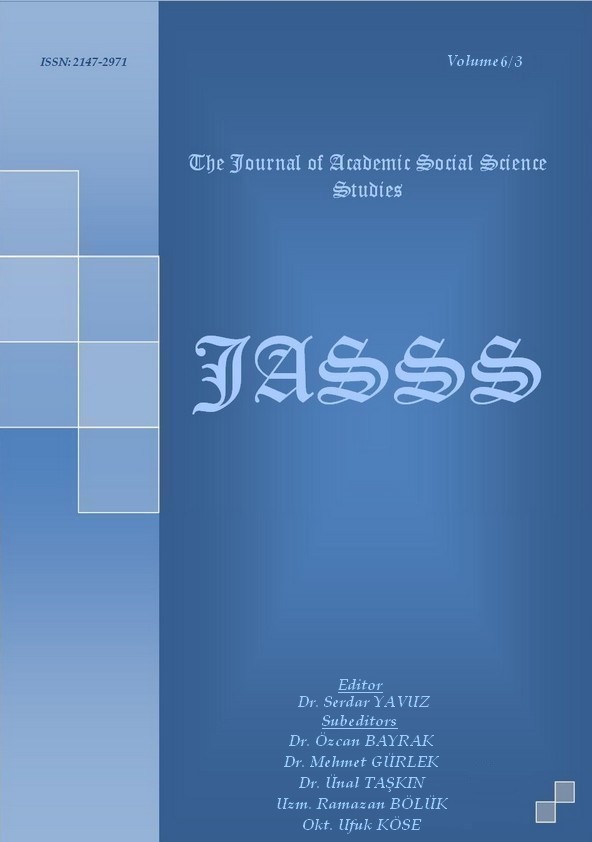Author :
Abstract
İkinci Abdülhamit dönemi Osmanlı İmparatorluğunun en hassas dönemidir. Osmanlı devletinin balkanlarda, Kuzey Afrika’da toprak kaybetme tehlikesi yaşadığı, içte de farklı görüşlerin iktidar mücadelesi verdikleri, dış güçlerin devletin kaderinde belirleyici olmak istedikleri bir dönemdir. ‘Hasta Adam’ durumuna düşen devletin kurtarılması için çeşitli düşünceler ortaya atılmıştır. Bu doğrultuda İkinci Abdülhamit’in görüşleri ve siyaseti de hem iç hem dış politikası farklı eleştirilere yol açmış geniş kitleleri ilgilendirir olmuştur. Söz konusu yıllar tarihçilerin olduğu kadar edebiyatçıların özellikle de romancıların ilgisini çekmiştir. Halit Ziya Uşaklıgil, Nesl-i Ahir ve Mithat Cemal Kuntay da Üç İstanbul adlı yapıtlarında bu dönemin çalkantılı yıllarını edebiyat kuramının ilkeleri çerçevesinde yazınsallaştırmışlardır. Romanlarda, anlatıcı ve başkahramanlar ortak bir tavırla, bu dönemi baskıcı, hiçbir siyasal ve sanatsal faaliyete göz yummayan bir devir olarak yansıtırlar. Kurulan hafiye teşkilatıyla bütün kesimleri gözetim altında tuttuğundan memlekette ciddi bir kırılma yaşandığı vurgulanmıştır. Baskı ve sansürün çeşitli alanlarda olumlu gelişmelerin meydana gelmesini engellendiği duyumsatılır. Aynı zamanda toplumsal alana yayılan korku ile her türlü sosyal faaliyet bıçak gibi kesilmiş hayat yaşanmaz hale gelmiştir. Korku, kaotik bir atmosfer oluşturarak toplumsal yaşamı derinden sarsarken kişileri de kişiliksizleştirmiştir. İlişkiler samimiyetten uzak bir hal almıştır. Geçmiş yaşamın cenneti olan konaklar, kılık değiştirerek sakinleriyle, tefrişatıyla alafranga görsellik sunarlar. Çalışmada, her iki romancının, İkinci Abdülhamit dönemine bakışları irdelenmiştir. İnceleme sırasında, romanlardaki vakaların, bilimsel tarihi gerçeklere uygunluğu, tarihçilere bırakılmıştır.
Keywords
Abstract
Period of Adbülhamit II is the most critical period of Ottoman Empire. It is a period when Ottoman Empire was exposed to lose land in the Balkans and South Africa, inside, different ideas struggling for power and when external forces wanted to play a decisive role in the Empire's destiny. Various ideas were put to rescue the empire that happened to be called “Sick Man”. At this point, Abdulhamid II’s ideas and approaches evoked various criticisms both for his internal and external policies and began to concern large mass. Those years caught attention of not only historians but also litterateurs, especially novelists. Halit Ziya Uşaklıgil, Nesl-i Ahir and Mithat Cemal Kuntay, Üç İstanbul wrote this period's tempestuous years in their works, within the framework of principles of literary theory. In the novels, narrator and protagonists narrated this era, with a common attitude, as oppressive, allowing no political or artistic activity. It is emphasized that there was a serious confliction because of the founded detective agency as it kept a close watch on all parts of the society. It makes one feel that suppression and censorship inhibited positive progresses from occurring. At the same time, with the fear spreading to social field, every kind of social activity came to a dead stop and life became unbearable. Fear, while agitating social life by creating a chaotic atmosphere, it also depersonalized people. Relationships came to a point being far from genuine. The mansions, the heaven of the past, present European visual with its residents and furniture, changing shapes. In this study, both of the novelists’ views on Abdulhamid II period is examined. Throughout the analysis, the coherence of the events in the novels with the scientific, historic facts is left to the historians.





